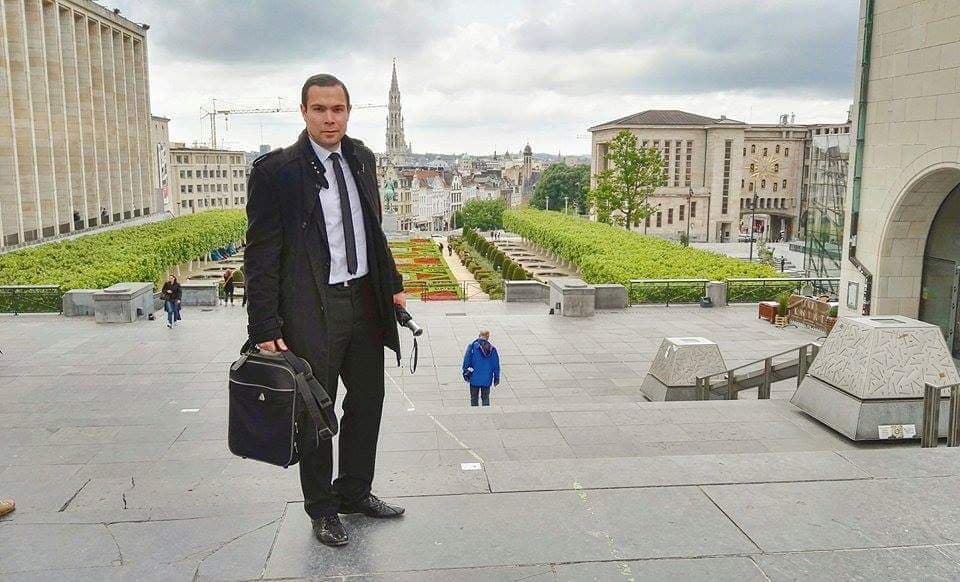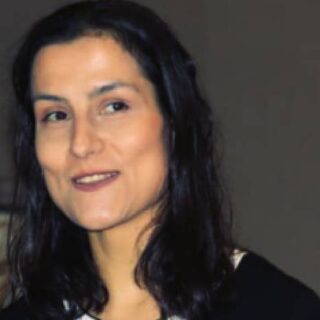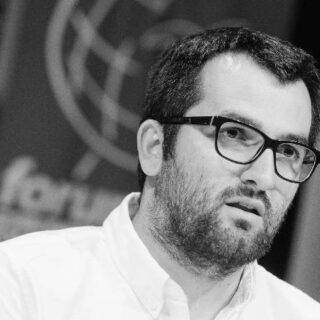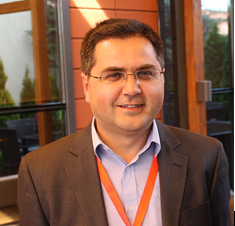The end of World War II led to the fulfilment of the long-standing dream of the Macedonian people to establish their own state. The first Macedonian state was proclaimed at the First Session of ASNOM – the Anti-fascist Assembly for the National Liberation of Macedonia. The Presidium (Presidency) of ASNOM was also elected at that session, with Metodija Andonov-Chento as the first elected President of the Presidium. This man is probably one of the most striking figures in the Macedonian history of the twentieth century.
Metodija Andonov-Chento was an avid fighter for the Macedonian national cause. Even in his youth, during the time of the Kingdom of Yugoslavia, Chento spoke openly about the Macedonian question. However, his struggle for the Macedonian national cause became fully-fledged during World War II. In 1943, immediately after his release from the prison administered by Bulgaria, Chento joined the partisans and the National Liberation War in Macedonia. and quickly grew as a leader of the pro-Macedonian wing. In the course of 1943, Metodija Andonov-Chento disagreed on several occasions with the delegate of the Supreme Headquarters and Central Committee of the Communist Party of Yugoslavia (CPY) in Macedonia, Svetozar Vukmanović – TEMPO. Consequently, on one occasion in that period, Chento expressed to Josip Broz Tito his dissatisfaction with the actions of Svetozar Vukmanović – TEMPO, underlining that often enough he did not act as a delegate, but rather as a chief commander.[1] Such pronounced activity of Metodija Andonov-Chento led him to become the President of the Initiative Board for convening ASNOM in 1944. It must be pointed out that in 1944, in preparation for convening the First Session of ASNOM, a delegation of the Initiative Board, led by Metodija Andonov-Chento, travelled to the Island of Vis to meet with Josip Broz Tito. There, he raised several key questions, including the unification of the Macedonian people.[2] Practically, the pro-Macedonian wing within the National Liberation War, led by Chento, based the national liberation and anti-fascist struggle in Macedonia on the foundations of the Ilinden traditions. That is why August 2 (the Ilinden day) was chosen as the day to hold the First Session of ASNOM. In addition, the majority of the ASNOM Presidium and ASNOM members were fighters from the Ilinden Uprising or their descendants. For Chento and the members of the pro-Macedonian wing, there was no dilemma that the Macedonian question had to be resolved integrally.
In addition to being a great fighter for the Macedonian national cause, Metodija Andonov-Chento was a man of great democratic capacity, and a fighter against the injustices in communist Yugoslavia. The end of the World War II and the formation of Yugoslavia brought new injustices and human rights violations on the territory of Macedonia. After the end of the war, under the guise of confronting the opponents and collaborators of the former occupying regimes in the Republics of Yugoslavia, Macedonia included, the new authorities displayed a high degree of arbitrariness and revanchism.[3] At that time, there was a practice on the territory of Macedonia to partially implement the legal procedure, containing major omissions, while frequently using terror and cruel methods to question the defendants.[4] The first years of communism in Yugoslavia – and Macedonia – were marked by mass shootings without trials. The ASNOM members, and especially Chento, who on several occasions went directly to Tito to complain about obvious cases, were against such mass shootings without trials.[5] As a supporter of the rule of law, Chento was a huge opponent of such processes taking place after the end of World War II, resulting in the killing of many innocent people with democratic views who supported a greater independence of Macedonia from the Yugoslav Federation. Chento was also a strong critic of the agrarian reform in Yugoslavia, of the centralization of the Yugoslav Federation, and of the undemocratic methods employed by the CPY and the OZNA. Consequently, Metodija Andonov-Chento and the pro-Macedonian wing within the National Liberation War became a thorn in the side of the Yugoslav communist political elites.
Therefore, after the First Session of ASNOM, the CPY put into motion several activities that by the end of 1945 resulted in a takeover of power in Macedonia by the pro-Yugoslav wing led by Lazar Kolishevski. This marked the beginning of purges and elimination of the pro-Macedonian wing within the Communist Party and in Macedonia.
Metodija Andonov-Chento was the first to be hit by such elimination actions. Initially, he resigned from the position of the President of the Presidium of the National Assembly of Macedonia. This eventually resulted in his secret arrest and a show trial against him. The epilogue of the show trial against Chento was an 11-year imprisonment sentence, and the loss of political rights for 5 years upon serving the prison sentence. The sentence was imposed for organizing an armed gang and attempting to cross the border to incite foreign countries to interfere in the internal affairs of the Federal People’s Republic of Yugoslavia (FPRY), which would harm the independence and inviolability of its territory.[6] Due to poor health, Metodija Andonov-Chento was released from prison after 9 years. He was not allowed though to obtain a passport to go to Switzerland for treatment. After ailing from gastric cancer for a long time, on 24 July 1957, Metodija Andonov-Chento died in his home in Prilep.
For many years following his death, Metodija Andonov-Chento was a forbidden topic in Macedonia. As a traitor and people’s enemy, Chento had no place in the Macedonian history from 1945 to 1990. However, the fall of communism and the changes in 1989 and 1990 led to changed attitudes towards Metodija Andonov-Chento. Since 1990 the Macedonian society felt the need to redress the injustice towards Chento and therefore overturned the 1946 trial ruling against him. With that, Metodija Andonov-Chento became the only legally rehabilitated victim of the communist regime in Macedonia to be followed by his political rehabilitation in 1991. Nowadays, Chento occupies an important place in the Macedonian history. Homage to his character and work is constantly emphasized by means of various symbolic reparations (building monuments and renaming streets in his honour, etc.). In 2010, the President of Macedonia, Gjorgi Ivanov, posthumously awarded Chento the Order of the Republic of Macedonia. It is worth mentioning that over the years, the character and work of Metodija Andonov-Chento were often used and abused for petty political party points, as was particularly evident during the Skopje 2014 project. Nowadays Metodija Andonov-Chento, once again holds without doubt his deserved place in the Macedonian history as a fighter for the Macedonian national cause and justice. A true Macedonian democrat and hero.
Marko Krtolica works as an assistant professor at the Department of Constitutional Law and Political System at the Faculty of Law “Iustinianus Primus” in Skopje. He graduated in Political Studes from the Faculty of Law “Iustinianus Primus” in Skopje. After graduation he enrolled in a master’s degree in European Integration and Regionalism organized by Carl Frances University in Graz and the Autonomous University of Barcelona. He completed his master studies in 2010 and thus became a master in European studies. During 2012, Marko Krtolica enrolled in doctoral studies in Political System at the Faculty of Law “Iustinianus Primus” in Skopje. He received his PhD in 2019 on the topic: “Transitional justice and its application in facing the communist past in Europe”.
[1]Todor Chepreganov, Sonja Nikolova and Zoran Nechev, “AVNOJ – ASNOM – Yalta – 8 September 1991 and the Macedonian statehood”, Proceedings of a scientific meeting on the occasion of the seventieth anniversary of the First Session of ASNOM (2014): 146.
[2]Violeta Achkoska, “The Creation and Development of the Contemporary Macedonian State (1941 – 1991)”, in The Creation of the Contemporary Macedonian State (Skopje: Makedonika litera, 2014), 122.
[3]Misho Dokmanović, Law and Politics in Macedonia (1946 – 1953) (Skopje: ISIE, 2010), 156.
[4]Dokmanović, Law and Politics in Macedonia, 155.
[5]Dimitar Mirchev, “Did ASNOM have a philosophy and ideology,” Proceedings of a scientific meeting on the occasion of marking the seventieth anniversary of the First Session of ASNOM (2014): 59.
[6]Dokmanović, Law and Politics in Macedonia, 158.




